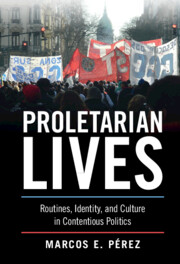Book contents
- Proletarian Lives
- Cambridge Studies in Contentious Politics
- Proletarian Lives
- Copyright page
- Dedication
- Contents
- Figures
- Acknowledgments
- 1 Introduction
- 2 “I Became a Bum”
- 3 “The Struggle Is on the Streets”
- 4 “I Know What It Means to Follow a Schedule”
- 5 “If It Rains or Hails, You Still Have to Show Up for Work”
- 6 “We Drink Mate, Eat a Good Stew, Talk … and That Way Time Flies”
- 7 “A Small Thing to Get By”
- 8 Conclusion
- Book part
- References
- Index
- Books in the Series (continued from p. iii)
3 - “The Struggle Is on the Streets”
Democracy, Neoliberalism, and Piquetero Mobilization
Published online by Cambridge University Press: 24 March 2022
- Proletarian Lives
- Cambridge Studies in Contentious Politics
- Proletarian Lives
- Copyright page
- Dedication
- Contents
- Figures
- Acknowledgments
- 1 Introduction
- 2 “I Became a Bum”
- 3 “The Struggle Is on the Streets”
- 4 “I Know What It Means to Follow a Schedule”
- 5 “If It Rains or Hails, You Still Have to Show Up for Work”
- 6 “We Drink Mate, Eat a Good Stew, Talk … and That Way Time Flies”
- 7 “A Small Thing to Get By”
- 8 Conclusion
- Book part
- References
- Index
- Books in the Series (continued from p. iii)
Summary
This chapter explores the history of the unemployed workers' movement, analyzing the trajectory of piquetero organizations as part of a broader wave of contention in Latin America. The chapter shows how these organizations developed as networks of neighborhood groups coordinated by a central leadership, with extensive connections to preexisting instances of community life. Organizers were able to draw on established cultural and political traditions at the local level to develop an effective repertoire of contention, which in turn helped their groups become efficient problem-solvers. The chapter then explores how over the last two decades these groups succeeded in accumulating resources and developing cores of committed members, leading to an enduring presence in Argentina’s popular politics. The chapter ends by arguing that individual-level dynamics such as the engagement in practices associated with working-class life played a crucial role in the enduring influence of piquetero networks, by helping them recruit and, most importantly, retain participants.
- Type
- Chapter
- Information
- Proletarian LivesRoutines, Identity, and Culture in Contentious Politics, pp. 49 - 70Publisher: Cambridge University PressPrint publication year: 2022

